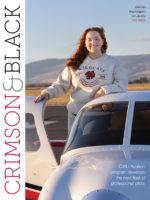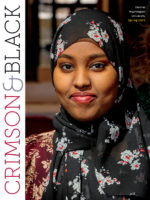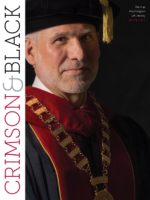
Imagine you’re giving a commencement speech. You’re not likely to talk about your paycheck or promotions. Instead, you’ll probably tell stories of the people who support you, the experiences that shape you and the values that guide your life.
Those things are part of your cultural wealth: “the reservoir of personal and community resources an individual may have beyond their income or accumulated financial wealth,” as described by Every Learner Everywhere, a national higher education collaborative.
Rather than pointing out the resources a person lacks, cultural wealth “illuminates an individual’s abilities and assets,” the organization says.
This wealth may come from family and community values, meaningful social connections, or challenges like racism or inequity. The results of unlocking this sense of cultural wealth include traits like perseverance and resistance to injustice. It shapes goals such as supporting a hometown community rather than moving to a big city.
Universities traditionally focus on individual accomplishment and measures of success that are more easily quantified. But students often come to Central Washington University with community-focused cultural wealth—and those resources should also be recognized, celebrated, and leveraged for student success.
Encouraging students to see their own cultural wealth may require patience, perseverance, humility, and a willingness for people serving within the university to overcome their own biases, according to Rob Ogburn, executive director of Central’s new Business and Community Services department and former College of Business clinical faculty member.
“What it really implies for us as a university is it’s not just an option; it’s a requirement,” Ogburn said. “If we’re going to meet our vision and mission in a meaningful way and help people create futures they are passionate about, we have to meet people where they’re at in their cultural context, not the other way around.”
The following profiles show how the concept of cultural wealth has helped shape the lives of three Wildcats, who are using what they have learned to give back to their communities.

Raelynne Crow
••••••••
Alumna Brings Indigenous Perspective to Her Profession
Raelynne Crow’s ancestors have been in the Pacific Northwest since time immemorial. Majoring in anthropology at Central helped Crow find a passion for studying her ancestral home and advocating for her community.
Crow, a descendent of the Confederated Tribes and Bands of the Yakama Nation, was the first person in her mother’s family born off the reservation.
Her father is White, and growing up with a mixed-race background made her curious from a young age about “how cultures worked, how they changed, how they adapted, how families thought about their own culture,” Crow said. It also made her acutely aware of racism and interested in how to dismantle racist structures in society.
She originally planned to become a teacher, but a custodian in Barto Hall, where Crow lived, encouraged her to try anthropology. From the first class, Crow knew she’d found her career direction.
Anthropology helped her understand her identity and personal goals in a new way. Her advisor and mentor, Anthropology Professor Patrick McCutcheon, encouraged her to explore what she could bring to anthropology as an indigenous person.
“When you grow up Native, you’re taught to be ashamed of that, because there’s a lot of cultural stigmas that are super harmful,” she said. “When I learned that the Yakama Nation, where my family’s from, had such a rich cultural and spiritual connection and history, it was the first time I’d ever seen my culture in such a positive light.”
She learned not only about anthropology’s dark history of exploitation and colonialism, but also how she could fight such racism. For her senior project, she worked at the Manastash Pines archaeological site in Kittitas County.
“An indigenous person working on their own ancestral site and using their own cultural views in the work is something that’s really new,” she said. “Just the existence of me being in archaeology is already an act of decolonization.”
Crow is now earning her Master of Arts in heritage archaeology at the University of Washington. For an internship this spring, she took on an archaeology survey project in Ellensburg, studying an area along the Yakima River for potential archaeological and historic resources. The project is designed to create opportunities to engage local people in their area’s history.
In her career, she plans to continue research and advocacy in the Northwest, combatting racism in her ancestral home.
“I want to put archaeology in control of the tribes and in control of indigenous people and other marginalized communities,” she said. “That’s something a lot of archaeologists miss; that they have to be advocates, and they have to find ways to serve marginalized communities.”

Alvaro "Gonzo" Gonzales
••••••••
Care for Others Started with Those Who Cared About Him
As a young teenager, Alvaro “Gonzo” Gonzales always knew how important it would be for him to graduate from high school. After seeing his family members struggle in school, he understood the value of earning his diploma.
“Graduating from high school was the biggest hurdle that I knew,” he said. “But I saw it as the culminating event in life that would allow everything to flow.”
Gonzales grew up in a family of farmworkers in the Yakima Valley and started helping with harvest in middle school. By the end of eighth grade, he’d been expelled twice.
Then, during his freshman year, Gonzales’ uncle encouraged him to join the wrestling team. His uncle died shortly after, but his advice changed Gonzales’ life.
He realized that he still wanted to compete, so he got serious about school. His teachers gave him opportunities to catch up, and his coaches encouraged him and gave him rides home from practice.
“I always got a lot of advice and wisdom from my coaches, Jim and Jeff Powers,” he said. “At the time, I didn’t really understand what they meant. But now I do.”
Wrestling gave Gonzales a found family and a place to prove his resilience and learn from failure. He was never a superstar, but it didn’t matter.
“Those coaches didn’t really care about how successful I was on the mat. They saw the things I overcame in life,” he said.
Gonzales graduated with a sense of confidence and purpose. He enlisted in the Marine Corps the day after high school graduation in 2013, after joining the Marine Corps Reserve, he enrolled at Yakima Valley College while working full-time at McDonald’s. Seeing how McDonald’s operated sparked his interest in business, and the restaurant owner encouraged him to follow his curiosity.
By the time Gonzales enrolled at Central, his life had taught him the joy of giving back to others, the importance of listening to people, and the skill of being a servant-leader. He drew together a circle of classmates, professors, and alumni who shared his values, regardless of how their backgrounds differed from his.
He pointed to his many mentors in the CWU College of Business, as well as former Center for Leadership and Community Education Director Andre Dickerson.
“He always made me feel like a million bucks,” Gonzales recalled.
To further give back—and to help address the shortage he noticed of business professionals who looked like him—he founded Central’s Association of Latino Professionals for America (ALPFA) chapter.
“It took me a while to figure it out, but I started to see that my network was getting built up, not because of what I had to offer, but because of the mindset or aspirations I had,” Gonzales said. “I had no money, no rich family, or family in high places where people could benefit from me. But, rather, they helped me because they saw my potential or saw how I was supporting others. They saw that by helping me, they could support my ALPFA student members or others that I was empowering.”
After earning degrees in accounting, economics, and business administration (finance) in 2020, Gonzales returned to the Yakima Valley. He’s now a senior audit/assurance associate at PricewaterhouseCoopers (PwC), a multi-national accounting and auditing firm. He also serves as a volunteer wrestling coach for his old teams in the Granger area, while also working as a WIAA referee.
Thinking back on his life, he remembers all he’s learned and everyone who has helped him—and he knows how much farther he can go with the help of others.
“I tend to be a lone wolf, but I have gotten far due to the support of others,” Gonzales said. “A lot of times people want to wait for somebody else to do the hard work. But when I see something that I believe is wrong, I just put in the work to create change for the things that are important to me.”

Erica Lua-Alonzo
••••••••
CWU-Yakima Student Finds Inspiration from Her Family
Family and culture are at the heart of Erica Lua-Alonzo’s mission to become a teacher.
She was first inspired by her mother, who worked multiple jobs as a single parent, then earned a college degree when
Lua-Alonzo was a teenager. Years later, when she was married with children of her own, she knew she wanted to pursue higher education, too.
“I figured, if my mom could do it, being a single parent with two kids, then I can do it. I can go back to school,” she said. “Will there be sacrifices? Yes, but people do it all the time.”
Lua-Alonzo was talented and driven as a teenager. She’d lost her childhood Spanish skills but was determined to reconnect with her language and culture. She re-learned Spanish through music, TV, and audiobooks, as well as speaking with her high school sweetheart, Jose Lua Lua, now her husband.
She wasn’t able to afford college right after high school, but she learned hard work and grit from years of working at Taco Bell and supporting her family.
“I was extremely motivated and ambitious, and I always have been,” Lua-Alonzo said. “I’ve always wanted a little bit more. I think that those sets of skills and qualities have really pushed me to be where I’m at now.”
Lua-Alonzo earned her associate’s degree from Yakima Valley College in 2018, with a special endorsement in Spanish. She became an administrative assistant at a school in Yakima and soon began working as a translator for the district.
“Being in education gives you a new perspective,” she said. “I really enjoyed being with kids and being part of that process of them learning and asking questions and just diving deeper into what motivates them, what struggles they face, why they do what they do. I was like, ‘I want to make a bigger impact.’”
At CWU-Yakima, she found encouraging, caring staff and faculty in a program that allowed her to take classes at night while continuing her day job.
Juggling school, work, and home life has been challenging, but Lua-Alonzo’s husband and children, now teenagers, keep her motivated.
“I’m not saying I want to hand them everything on a silver platter, but I do want them to not struggle as much as I did,” she said. “I love being Latino and Hispanic, but Latino women don’t just need to be moms. We can be career women, we can hold important positions and roles, and that’s important for my daughters to know.”
After student teaching in the fall and earning her degree, Lua-Alonzo hopes to teach in a dual-language program in the Yakima Valley, bringing her love for education and language to the community that has always been part of her family’s life.






comments powered by Disqus